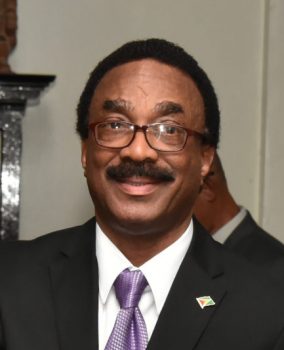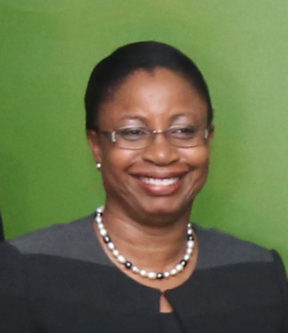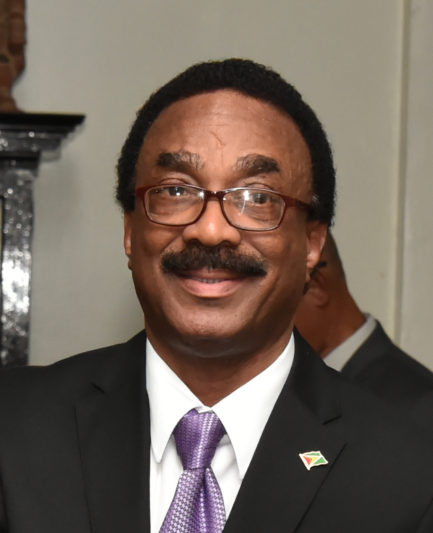Amid an outpouring of opprobrium, Attorney General (AG) Basil Williams yesterday said that President David Granger found the basis for his unilateral declaration of a chairman of GECOM in the ruling of Chief Justice (ag) Roxane George in the case of Marcel Gaskin v AG etal.
A key part of the AG’s argument yesterday related to the judge’s consideration of a proviso in the constitution for the President to make a unilateral decision. This is a controversial area as counsel for Gaskin has argued that the proviso was never part of the declaratory orders sought on the meaning of Article 161(2) from the court and that the Chief Justice had overreached. The Chief Justice’s ruling had also acknowledged that full arguments had not been heard on the proviso thereby giving the impression that what she had to say on it was not substantive or definitive. The application by Gaskin was filed following the rejection by Granger of the first list of GECOM nominees from Opposition Leader Bharrat Jagdeo.
Granger’s unilateral naming of 84-year-old Justice James Patterson as GECOM Chairman has seen widespread condemnation from civil society and in a statement last evening Williams set out the aspects of Justice George’s ruling that the President relied on.
He quoted page 29 of Justice George’s ruling which states `”The Leader of the Opposition and others for that matter, may not agree with the reasons given, but they must be given so that the parameters for the submission of another list, if required would be set”.

Basil Williams
“His Excellency understands this to mean that only where he agrees to more than one list reasons must be given”, the AG’s Chambers said in its statement before reminding that after rejecting the first list, the president did give the Leader of the Opposition on his request a list of criteria or characteristics that would make listed persons acceptable to him. However, after the first list was rejected Granger gave no reasons but only presented the characteristics sought.
Those characteristics are that the person is deemed to have wide electoral knowledge, capable of handling electoral matters because he or she is qualified to exercise unlimited jurisdiction in civil matters; he or she will discharge their functions without fear or favour, that is, they will not allow any person or organisation to bulldoze or influence them to compromise their neutrality; this person will discharge their functions neutrally between the two opposing parties as they would have done in Court between two opposing litigants, the person will not be an activist in any form (gender, racial, theological, religious etc.); they should not have any political affiliation or belong to any political party in any form, apparent or hidden, and they should have a general character of honesty, integrity, faithfulness, diligence and fear of God in the discharge of their duty as Chairman.

“The names of the listed persons in the final list have not conformed to these criteria. Having rejected the final list reliance was placed on the Learned Chief Justice’s ruling that the President in the exercise of his judgement to reject the final list could ‘Resort to the proviso to Article 161(2) which permits the President to act independently to appoint a person of the Judicial category to be the Chairman of GECOM, that is a person who is presumptively fit and proper’”, the statement added.
That proviso states: “Provided that if the Leader of the Opposition fails to submit a list as provided for, the President shall appoint a person who holds or has held office as a judge of a court having unlimited jurisdiction …”
The AG’s Chambers also said that the president considered the provisions of Article 161 (2) which gives him the discretion to appoint a Chairman from the final list submitted.
That Article states “Subject to the provisions of paragraph (6), the Chairman of the Elections Commission shall be appointed by the President from among persons who hold or have held office as a judge of a court having unlimited jurisdiction in civil and criminal matters in some part of the Commonwealth or a court having jurisdiction in appeals from any such court or who are qualified to be appointed as any such judge”.
The statement said too that the Constitution empowers the president to act in his own deliberate judgement when exercising such a discretion.
It added that the president also considered other aspects of the ruling made by Justice George. The statement quoted page 30 which says ‘The submission of the list does not mean that the President is obliged to accept the list or the persons named in it. If the President is of the view that the list is deficient either in totality or in the names that have been included, he can exercise his discretion to deem the entire list unacceptable” and page 26 which states `If the President considers that one or more persons on the list is not a fit and proper person and therefore unacceptable, then he may decide to reject the entire list as being incomplete or restrictive, or he may decide to choose one of the persons if they qualify even though every other name on the list is not acceptable. Therefore the whole list need not be rejected’.
According to the AG’s Chambers having considered those aspects of the ruling the president found Jagdeo’s final list unacceptable.
“It is in the light of these premises His Excellency appointed the Hon. Justice Patterson as a fit and proper person to the office of GECOM Chairman”, the statement said.
Bar Association
Prior to the AG’s statement and shortly after swearing in the members of the Local Government Commission at State House yesterday, Granger was asked to respond to calls from the Guyana Bar Association for him to give reasons for the rejection of Jagdeo’s nominees in keeping with the ruling handed down by Chief Justice George.
“I do not know that requirement is enshrined in the constitution. Guyana is a small country and we have to be very careful about these judgements, about person’s character and their capabilities”, he told reporters.
Jagdeo’s first nominees were Major General (ret’d) Norman McLean, attorney and accountant Christopher Ram, business executive Ramesh Dookhoo, governance and conflict resolution specialist Lawrence Lachmansingh, Indian rights activist Ryhaan Shah and historian Dr James Rose.
He subsequently nominated former Appellate Judge B S Roy, former High Court Justice William Ramlal, former magistrate and now practising attorney Oneidge Walrond-Allicock, attorney Kashir Khan, attorney Nadia Sagar and former Guyana Defence Force Captain and businessman Gerald Gouveia for the post. They were also subsequently rejected.
On August 25, Jagdeo submitted his third list of nominees, comprising Joe Singh, a retired Guyana Defence Force Major General, who previously served as Gecom Chairman; former long-serving magistrate Krisndat Persaud; attorneys Teni Housty and Sanjeev Datadin; pilot and biodiversity advocate Annette Arjoon-Martins; and Adventist pastor and agriculturalist Onesi La Fleur.
Granger said that he found the lists unacceptable but he never expanded on what that meant.
The Bar Association in a press release on Saturday called on Granger to publicly state his reasons to justify his actions. “The Bar Council expects that reasons for rejecting the eighteen persons leading to the unilateral appointment of Justice James Patterson will be provided forthwith to avoid the necessity of further litigation on this issue on its part,” the release said.
The Bar Association added that the ruling of the Chief Justice that reasons are required is part of the law of Guyana until such time as it may be set aside by a higher court. “The Constitution must therefore be read in light of that decision,” it said.
“I have to be advised. As I said I have not seen anything in the constitution which requires me. I know the Chief Justice has made certain statements. I intend not to contradict the Chief Justice but I have not been advised that that is a requirement which is enforceable. I don’t know that is enforceable”, Granger further added yesterday.
Last Thursday evening, two hours after informing Jagdeo that the third list was unacceptable, Justice Patterson was sworn in as the new Chairman. The post was vacant since February following the departure of Dr. Steve Surujbally.
Former Chief Justice
Meanwhile, despite the concerns raised that there may be incorrect information in Patterson’s Curriculum Vitae, Granger yesterday insisted that he is a former Chief Justice of Grenada.
“He was a judge… of the High Court in Guyana…the information I have is that he was Chief Justice of Grenada. His Curriculum Vitae is not a secret. You can examine it for yourself. He was a judge in Guyana. That’s important,” he said.
Patterson’s Chief Justice qualification was first raised by PPP MP Anil Nandlall on Sunday.
“In his resume, Justice Patterson states that he was the Chief Justice of Grenada in 1987. For the last three days I have spoken to several retired judges and lawyers from Grenada and in the Eastern Caribbean jurisdiction and all of them have confirmed that Justice Patterson was never appointed Chief Justice of Grenada. I have consulted a book which chronicled all the important post holders of Grenada and the Chief Justice of Grenada in 1987 is listed as Samuel Graham. I have received information that a Guyanese who worked for over 25 years in Grenada in a very high public office has advised the President that Justice Patterson was never appointed Chief Justice in Grenada, yet the President cites Justice Patterson’s alleged appointment as Chief Justice of Grenada as a basis of appointing him chair of Gecom,” Nandlall charged.
This newspaper found online references to Patterson as the acting Chief Justice but nothing which stated that he was appointed to the substantive post.
On Patterson’s CV which was seen by this newspaper, the Chief Justice’s qualification is listed under the year 1987; there is no specific time period. A source told this newspaper that he acted in that post for a short period of time.
Nandlall also took issue with the fact that Patterson being a religious leader was not in keeping with the criteria set by Granger.
“In a list of criteria submitted by the President to the Leader of the Opposition, the President indicated that the person who he is looking for must not be a religious activist or leader. In his CV, Justice Patterson described himself as a reverend and an entire page in that CV is dedicated to listing the several theological qualifications which he possesses and religious posts which he held. Justice Patterson can by no objective standards be adjudged as impartial or independent,” he added.
According to his CV, Patterson said that he is a trained theologian and was Chairman of the Church of God in Guyana from 1998 to 2001 and a Senior Pastor at the Jesus Deliverance Mission, located in Kitty, Georgetown following that.
When asked to respond to this, Granger said “I was asked by the Leader of the Opposition to suggest certain criteria which were not necessarily incorporated in the constitution and I proposed certain criteria”.
Granger later denied that Patterson is a member of the PNC. “I am not aware of that. I have never seen him at the PNC. Never”, he said as he walked off.
Nandlall claimed that he has photographic evidence that Patterson was a pallbearer at former President Desmond Hoyte’s funeral which was a private event for Party leaders and supporters which was held at Merriman’s Funeral Parlour. He claimed too that Patterson is also a member of the Facebook page calling itself ‘Rally around the People’s National Congress’, established just before the 2015 General Elections.
“How can anyone have any confidence in this person’s independence, impartiality and integrity?” he questioned.
Meanwhile, Granger urged the media to look at the entire picture and to not be one-sided. “Do not judge what occurred in the actual conclusion of the negotiations with the Leader of the Opposition as the totality. This process started a year ago when the People’s Progressive Party started to hound Dr. Surubally out of office. They protested, they picketed and they drove him out of office and this process has been dragged on for the entire year and the people of this country demand …deserve…need to have a functioning elections commission and the process cannot go on at the whims and fancies of the Leader of the Opposition”, he said.
He further said that he has been abiding by the Constitution.
“The Constitution is very clear. I have acted at all material times within the constitution. Let us get on with the business of running the country”, he said.






